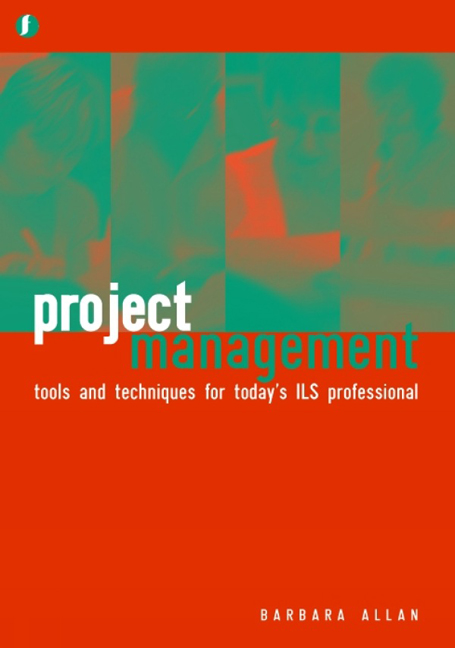Book contents
- Frontmatter
- Contents
- List of tables
- List of figures
- Acknowledgements
- Part 1 Introduction
- Part 2 The project life cycle, systems and processes
- Part 3 Projects and people
- 8 The people side of projects
- 9 Working in partnership
- 10 Working on projects
- 11 Project management skills and training
- Appendix A The language of funding
- Appendix B Resources
- Index
10 - Working on projects
from Part 3 - Projects and people
Published online by Cambridge University Press: 08 June 2018
- Frontmatter
- Contents
- List of tables
- List of figures
- Acknowledgements
- Part 1 Introduction
- Part 2 The project life cycle, systems and processes
- Part 3 Projects and people
- 8 The people side of projects
- 9 Working in partnership
- 10 Working on projects
- 11 Project management skills and training
- Appendix A The language of funding
- Appendix B Resources
- Index
Summary
Introduction
Project work provides library and information workers with an opportunity to develop their skills and experience by contributing to new and innovative activities. Projects often involve working at the ‘cutting edge’ of professional practice, working with technological developments and innovations, and also experiencing new and different ways of working. In many respects the project work of the last decade has become the standard practice in current library and information work, which means that getting involved in projects also provides project workers with the opportunity to be involved in creating the future. This can be extremely exciting as well as challenging.
The purpose of this chapter is to explore working on projects. Project workers may be employed solely on project work, often on a contract basis, or they may be working on a project in addition to their ‘full-time’ library or information role. In both of these situations individuals are faced with a range of issues that they need to tackle if they are to be effective in their role(s). This chapter looks at both types of worker. Finally the chapter considers the effective project worker and this is explored using the following themes: managing yourself, learning from experience, time management, gaining personal and career support, and using projects for career development.
The rise of the contract project worker
In line with the rise in the allocation of government and other funds through competitive tendering for projects, there has been a rise in the number of library and information staff working on fixed-term contracts. These project workers represent library and information professionals at different stages in their careers: some project workers will be at the start of their careers and use temporary relatively short-term project contracts as a means to progressing into more permanent employment; many self-employed information workers use project work as a means of building their portfolio of work and also developing their knowledge and skills; in contrast ‘retired’ or ‘semi-retired’ library and information workers may become involved in project work as a means of supplementing their income and also keeping in touch with professional activities.
- Type
- Chapter
- Information
- Project ManagementTools and techniques for today's ILS professional, pp. 165 - 178Publisher: FacetPrint publication year: 2004



